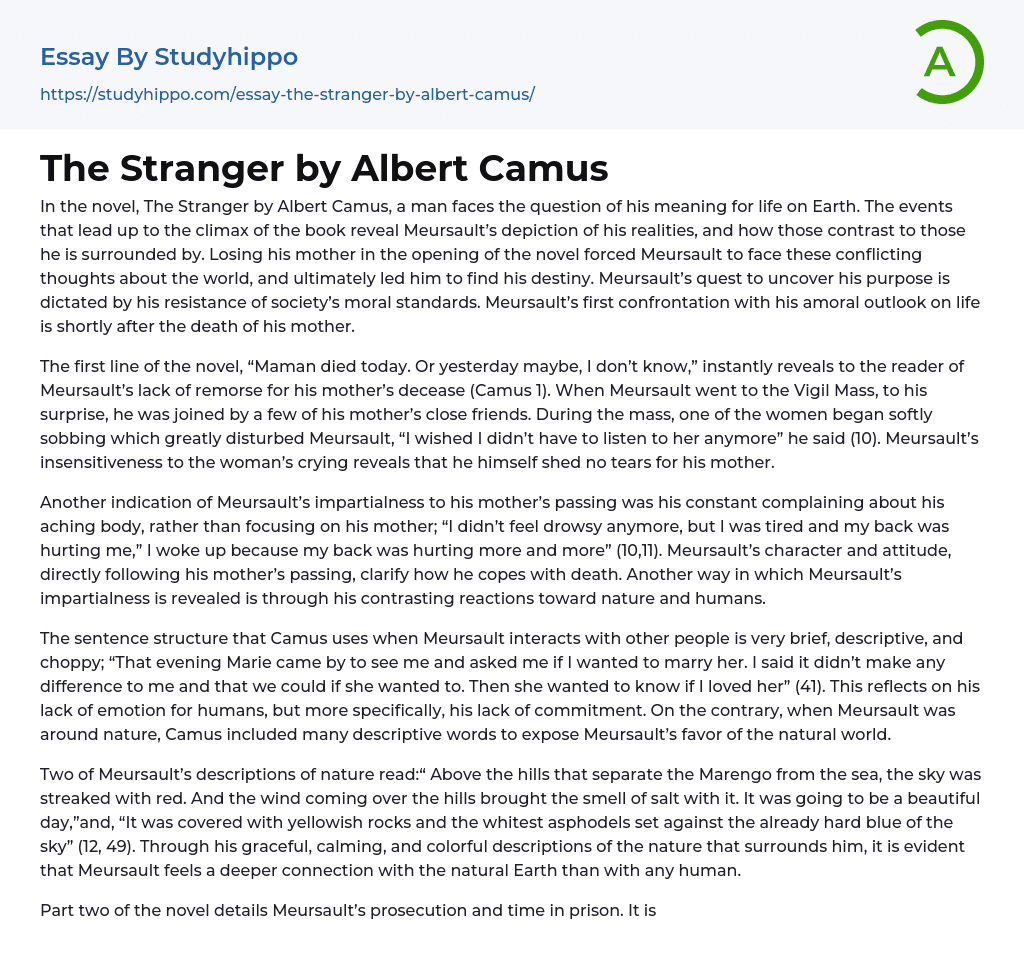In Albert Camus' novel, The Stranger, the protagonist grapples with the existential question of his purpose on Earth. Through the course of the story, Meursault's experiences shed light on his unique perspective and contrasting realities compared to those around him. The loss of his mother serves as a catalyst for Meursault's exploration of his conflicting thoughts about the world and ultimately leads him towards his destiny. Guided by his resistance to societal moral norms, Meursault embarks on a quest to unravel his true purpose. This quest begins shortly after his mother's passing, when he first confronts his amoral outlook on life.
Camus' novel begins with the line, "Maman died today. Or yesterday maybe, I don’t know," highlighting Meursault's lack of remorse for his mother's death (1). Meursault is taken aback when some of his mother's friends join him
...at the Vigil Mass. While at the mass, one of the women quietly cries, which greatly disturbs Meursault. He confesses, "I wished I didn't have to listen to her anymore" (10). Meursault's indifference towards the woman's tears reflects his own lack of grief for his mother.
Meursault’s lack of emotional response to his mother’s death is evident in his continuous complaints about his physical discomfort. Instead of grieving or showing concern for his mother, he focuses on his own bodily pain. For example, he states, “I didn’t feel drowsy anymore, but I was tired and my back was hurting me” and later mentions, “I woke up because my back was hurting more and more” (10,11). These statements highlight Meursault’s character and attitude immediately after his mother’s passing, shedding light on how he handles the concept of death. Furthermore, Meursault’s
impartialness is also demonstrated through his contrasting reactions towards nature and humans.
Camus utilizes a concise and fragmented sentence structure when Meursault interacts with others, as evidenced by the passage: "That evening Marie came by to see me and asked me if I wanted to marry her. I said it didn’t make any difference to me and that we could if she wanted to. Then she wanted to know if I loved her" (41). This choice in sentence structure reflects Meursault's emotional detachment towards humans, particularly his lack of commitment. In contrast, when Meursault is in the presence of nature, Camus employs numerous descriptive words to highlight Meursault's affinity for the natural world.
Meursault makes two vivid descriptions of nature. One of them is, "Above the hills that separate the Marengo from the sea, the sky was streaked with red. And the wind coming over the hills brought the smell of salt with it. It was going to be a beautiful day." The other description says, "It was covered with yellowish rocks and the whitest asphodels set against the already hard blue of the sky." These descriptions highlight Meursault's deep connection with the natural world, which is stronger than any connection he feels with other people.
Part two of the novel focuses on Meursault's prosecution and imprisonment. This period allows Meursault to reflect on his existence and come to the realization that there is no purpose in life. In his own words, he says, "I opened myself to the gentle indifference of the world" (122), understanding that just like him, the world lacks compassion for others. It is during this time that he accepts his inevitable fate
of being executed and finds solace in the enigma of death.
- Book Summary essays
- Metaphor essays
- Reader essays
- Rhyme essays
- Literary devices essays
- Villain essays
- Books essays
- Genre essays
- Literary Criticism essays
- Writer essays
- Protagonist essays
- Simile essays
- Poem essays
- Book Report essays
- Book Review essays
- Greek Mythology essays
- Plot essays
- Tragic Hero essays
- Coming of Age essays
- Play essays
- Rhetoric essays
- Rhetorical Question essays
- Translation essays
- Understanding essays
- Reason essays
- Character essays
- Letter essays
- American Literature essays
- Literature Review essays
- Utopia essays
- Poetry Analysis essays
- Dante's Inferno essays
- Between The World and Me essays
- Incidents in The Life of a Slave Girl essays
- Flowers for Algernon essays
- Myth essays
- Everyday Use essays
- Boo Radley essays
- Genesis essays
- Richard iii essays
- Alice in Wonderland essays
- On the road essays
- Ozymandias essays
- The Nightingale essays
- Holden Caulfield essays
- Animal Farm essays
- 1984 essays
- A Hanging essays
- Shooting An Elephant essays
- A Tale Of Two Cities essays




